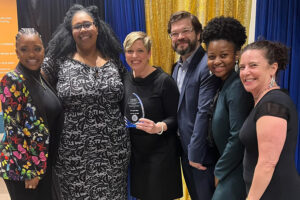The Legal Clinic at UT Law
In a clinical course at the College of Law Legal Clinic, students find opportunities to build an experiential bridge between law school and practice by representing real clients facing real legal issues.
Students operate as practitioners in a public interest law firm and are immersed in all facets of their case and project work, collaborating closely with clinical faculty to ensure proper and complete representation. The curriculum allows students time for critical review and reflection as they evaluate their own work and the legal work of their classmates.
Students deepen their legal knowledge, strengthen their lawyering skills, and grow their professional experience through our legal clinics. Our clinical faculty guide, mentor, and challenge students while also assisting them in gaining expertise in clinical scholarship.

The Legal Clinic at UT Law
In a clinical course at the College of Law Legal Clinic, students find opportunities to build an experiential bridge between law school and practice by representing real clients facing real legal issues.
Students operate as practitioners in a public interest law firm and are immersed in all facets of their case and project work, collaborating closely with clinical faculty to ensure proper and complete representation. The curriculum allows students time for critical review and reflection as they evaluate their own work and the legal work of their classmates.
Students deepen their legal knowledge, strengthen their lawyering skills, and grow their professional experience through our legal clinics. Our clinical faculty guide, mentor, and challenge students while also assisting them in gaining expertise in clinical scholarship.

Learn about each of our available clinics
The Advocacy Clinic is the longest-running legal clinic in the United States and remains one of the most successful programs of its kind.
In this clinic, students represent their own clients in various types of legal disputes involving criminal, housing, and juvenile law. Under Tennessee’s Student Practice Rule, students who have reached their fourth semester of law school, are allowed to represent clients under the supervision of faculty members. Client representation requires students to engage in the full range of lawyer duties, beginning with client interviews and proceeding through factual investigation, case development, negotiation, and often on to hearings or trial. Thus students, develop a wide range of lawyering skills, including:
– fact investigation
– client interviewing and counseling
– witness interviewing
– developing of case strategy, theme, and theory
– drafting and arguing pretrial motions
– trial preparation and presentation
– negotiating with opposing parties
– developing and exercising professional judgment
The Advocacy Clinic functions like a law firm, with the entire “firm” meeting weekly with clinic faculty and guest speakers to discuss cases, tactics, applicable law and strategy.
Law students working in the Domestic Violence Clinic represent actual clients in contested hearings and trials in Knox County’s Fourth Circuit Court. Students represent victims of domestic violence in gaining and enforcing orders of protection and in related matters.
In addition to appearing in court, students meet weekly as a firm with their faculty supervisor. In order to participate in the Domestic Violence Clinic, students must have taken Legal Profession or be currently enrolled. The three-credit, one-semester course is offered in the fall and spring semesters.
Partnership with the College of Social Work
The Domestic Violence Clinic partners with the UT College of Social Work to place an intern from the Master of Science in Social Work program in the Domestic Violence Clinic. Through this partnership, the Domestic Violence Clinic and the College of Social Work collaborate to address the multiple needs of clients who are domestic violence victims.
The Expungement Mini-Clinic focuses on one of the most significant criminal reentry issues facing people who have been arrested for a crime – cleaning up a person’s criminal record.
Students assist clients with Tennessee’s complex expungement process from conducting the initial interview to preparing the expungement petition. The course integrates statutory interpretation, lawyering skills and ethics through an in-depth study of Tennessee’s expungement statutes, related caselaw and rules of professional conduct. Students build their skills in interviewing, counseling and advocacy through in-class discussions, simulations and interactions with clients.
The Expungement Mini Clinic is a one-credit hour course.
Students in the Family Law Mediation Clinic focus on mediation process, theory, strategy, tactics and skills while mediating family law disputes. The students study and develop mediation skills through readings and simulations and by serving as mediators in the Knox County Juvenile Court and other settings. Participation in the clinic satisfies the Tennessee Supreme Court Rule 31 training requirements for certification as a family law mediator.
Students must have taken Legal Profession to participate in the Family Mediation Clinic.
Students in the Mediation Clinic have the opportunity to acquire and enhance skills as mediators in actual legal disputes in the Knox County General Sessions Court and other settings.
Through partnerships with experienced volunteers. clinic students co-mediate cases that may involve landlord–tenant, services or property damage disputes.
The clinic works closely with the Community Mediation Center and the East Tennessee mediation community to promote the use of mediation as an alternative dispute resolution process and to provide training and professional development opportunities for community mediators, as well as UT Law students. In the clinic, students observe experienced mediators in specialized subject areas like divorce and custody, employment discrimination, and workers’ compensation. Completion of the clinic satisfies Tennessee Supreme Court Rule 31’s training requirements for certification as a general civil mediator, a benefit that is valuable to students seeking to enhance their professional credentials.
Students in the Mediation Clinic must have taken Legal Profession and also must take Law and Community Improvement while they are taking the Mediation Clinic. The clinic combined with the Law and Community Improvement class is a six-credit course.
Students will learn transactional legal skills through the representation of small businesses, nonprofit organizations, community-based associations, entrepreneurs, and artists.
Through supervised fieldwork, student attorneys will assume primary responsibility for representing clients with various non-litigation matters. Such matters might include:
– providing advice regarding legal entity choice and forming the entity
– identifying state and local business licensing and permitting requirements
– providing advice regarding tax-exempt status
– drafting governance documents
– negotiating and drafting contracts
– advising entities on employment and independent contractor arrangements
– assisting with trademark and copyright registration
The Transactional Law Clinic provides a valuable service to the community while giving students the unique opportunity to acquire skills, training, and experience essential to representing clients in transactional matters and which are transferable to virtually any practice area.
The Transactional Law Clinic participates in the Law School Certification Program of the United States Patent and Trademark office. Students provide trademark legal services to clients on a pro bono basis, and represent those clients before the USPTO.
Students must have taken Business Associations, and must have taken or be taking Professional Responsibility and Contract Drafting to participate in the Transactional Law Clinic. The Transactional Law Clinic is a six-credit course, offered during the fall and spring semesters.
Students in the Homer A. Jones, Jr. Wills Clinic represent economically disadvantaged clients in estate planning and uncontested young-adult conservatorships. Students interview clients to evaluate their legal needs, then practice drafting and revising and assisting with execution of relevant documents, including wills (with testamentary trusts), powers of attorney, advance directives, and conservatorship pleadings.
The clinic is offered as a four-credit, one-semester course during fall and spring terms.
Potential clients and inquiries may leave messages on the Wills Clinic’s direct line at (865) 974-8894
CLINIC NEWS

Joy Radice Appointed Chair of the Tennessee Supreme Court Access to Justice Commission
The Tennessee Supreme Court appointed University of Tennessee College of Law Director of Clinical Programs and Associate Professor of Law Joy Radice to serve as

UT College of Law ranked among top programs by U.S. News
In the newly released 2024 U.S. News & World Report Best Law Schools rankings, the University of Tennessee College of Law continued to be ranked

UT Legal Clinic Honored for Extraordinary Community Service
This fall, the Legal Clinic at the University of Tennessee College of Law was recognized by both the Knoxville Branch of the NAACP and Legal
Contact Us
UT Legal Clinic
1505 W. Cumberland Ave.
Knoxville, Tennessee 37996
Phone: 865-974-2331
Office: Suite 83
Email: legalclinic@utk.edu
Contact Us
UT Legal Clinic
1505 W. Cumberland Ave.
Knoxville, Tennessee 37996
Phone: 865-974-2331
Office: Suite 83
E-mail: legalclinic@utk.edu
